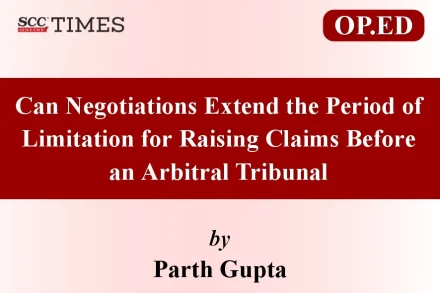
Arbitral Tribunal

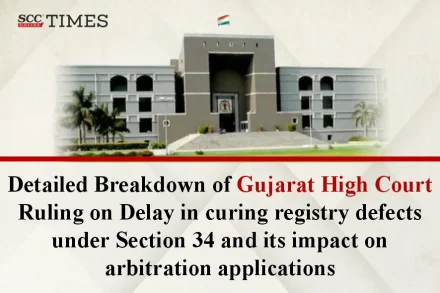
Detailed Breakdown of Gujarat High Court Ruling on Delay in curing registry defects under Section 34 and its impact on arbitration applications
The Court noted that the registry did not follow the procedure prescribed in the GHC Rules for movement of the papers from the registry to the competent Court, thus there was no occasion for consideration by the Court concerned as to whether the respondents were entitled to condonation of delay in removal of office objections.

Pendency of Arbitration does not prevent stamp authorities from initiating proceedings; Show Cause notice not an adverse order affecting parties’ rights: Allahabad HC
“The right to know and to effectively respond to the charges has been recognized as a fundamental feature of any administrative adjudicatory process. It is a fundamental principle of fairness that a party should have prior notice of the case against him and an opportunity to properly respond to the same”
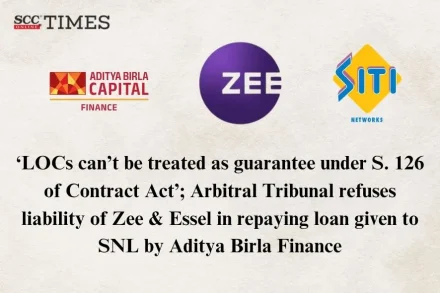
‘LOCs can’t be treated as guarantee under S. 126 of Contract Act’; Arbitral Tribunal refuses liability of Zee & Essel in repaying loan given to SNL by Aditya Birla Finance
“Zee and Essel undertook to ensure that SNL would fulfil its obligations and assured that the outstanding amount would be paid. To treat the said LOCs as guarantees would amount to adding words which were not written.”
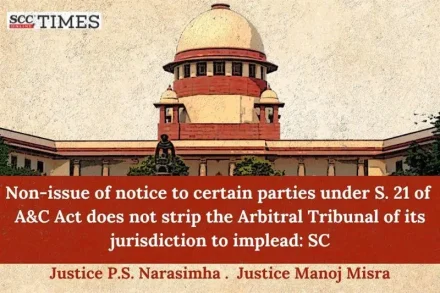
Non-issue of notice to certain parties under S. 21 of A&C Act does not strip the Arbitral Tribunal of its jurisdiction to implead: SC
“Section 21 does not expressly mandate the claimant to send a notice invoking arbitration to the respondents. However, the provision necessarily mandates such notice, as its receipt by the respondent is required to commence arbitral proceedings”.
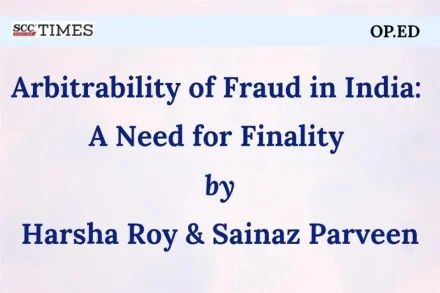
Arbitrability of Fraud in India: A Need for Finality
by Harsha Roy* and Sainaz Parveen**
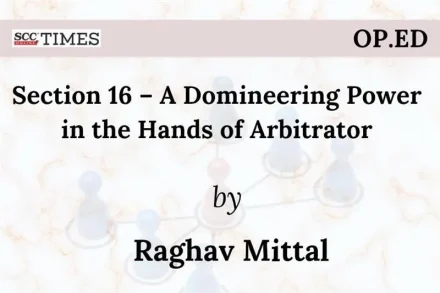
Section 16 – A Domineering Power in the Hands of Arbitrator
by Raghav Mittal*
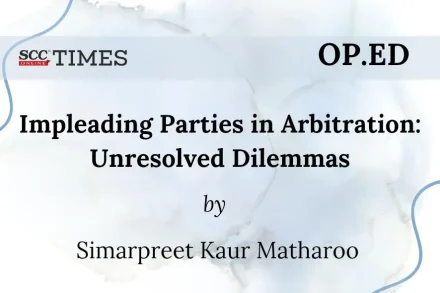
Impleading Parties in Arbitration: Unresolved Dilemmas
by Simarpreet Kaur Matharoo*

‘Duty of Referral Court in post-award stage to prevent misuse of arbitration’; Delhi HC rejects plea by Jaiprakash Associates for second arbitration in Rs. 360 Crores claim
“Applying the ‘eye of the needle’ test, the Court has no hesitation in observing that the prima facie scrutiny of the facts of the present case, leads to a clear conclusion that there is not even a vestige of doubt that the claim is non-arbitrable.”

Question regarding substance of existence of agreement can only be determined by Arbitral Tribunal: Bombay HC
Even if it is presumed that signing an agreement with an arbitration clause can be regarded as submission of a (non-existent) dispute to arbitration, it will not follow that as a matter of law, since there will be no implied authority to execute such a contract. All these are issues that will pose mixed questions of fact and law and will relate to the substance of existence rather than the form of existence, i.e., a written agreement.
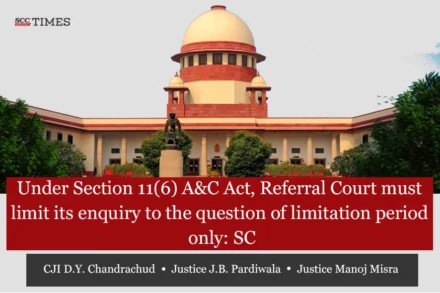
Under Section 11(6) A&C Act, Referral Court must limit its enquiry to the question of limitation period only: SC
Referral courts, at the stage of deciding an application for appointment of arbitrator, must not conduct an intricate evidentiary enquiry into the question whether the claims raised by the applicant are time barred.”
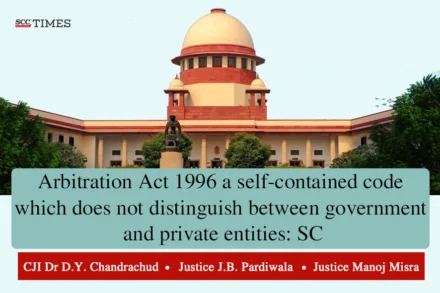
Arbitration Act 1996 a self-contained code which does not distinguish between government and private entities: SC
The Court said that governmental entities must be treated in a similar fashion to private parties insofar as proceedings under the Arbitration Act are concerned, except where otherwise indicated by law.
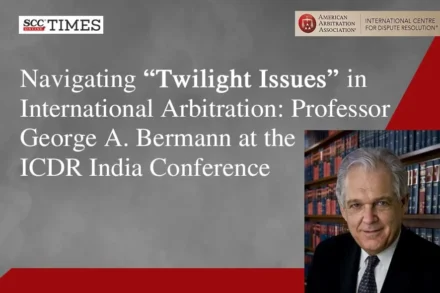
Navigating “Twilight Issues” in International Arbitration: Professor George A. Bermann at the ICDR India Conference
This report summarizes the insights from the Keynote Address delivered by Professor George A. Bermann at the ICDR India Conference.

Delhi High Court refuses to interfere with Award passed by Arbitral Tribunal in petition by the Airports Authority of India
‘Courts, while evaluating a challenge under Section 34, would not be justified in faulting an award merely because an alternative view was possible or that, in their opinion, a more just conclusion could have been reached.’
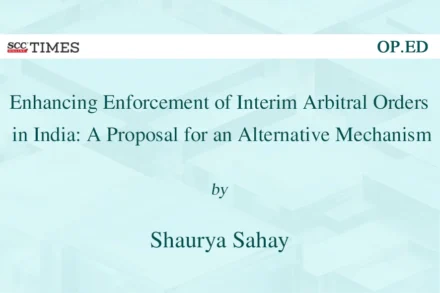
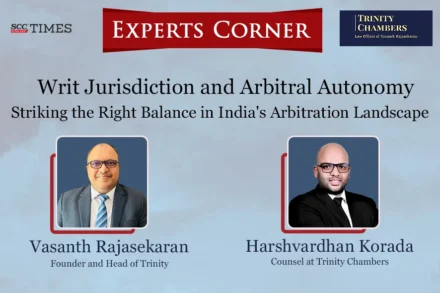
Writ Jurisdiction and Arbitral Autonomy: Striking the Right Balance in India’s Arbitration Landscape
by Vasanth Rajasekaran* and Harshvardhan Korada**
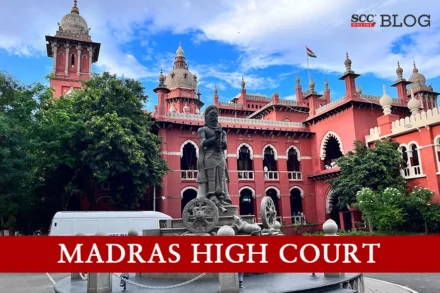
‘Section 29-A of Arbitration Act is procedural and discretion is given to parties to extend arbitration period further for 6 months’ ; Madras HC upholds arbitration award passed beyond 12 months
“The legislative intent of inserting Section 29-A of the Act is only for expeditious disposal of the arbitration proceedings and not to confer a new defence upon an unsuccessful party to challenge the award and to reopen the entire proceedings.”

‘Necessary ingredients of Sec. 11(6) clearly exist’; Delhi HC appoints Arbitrator to resolve dispute between Yuvraj Singh and real estate developer for claim of Rs. 1.38 Crores
“Deletion of party is an issue to be decided by the Arbitral Tribunal, it cannot be looked into by the Court under Section 11(6) of the Arbitration Act”
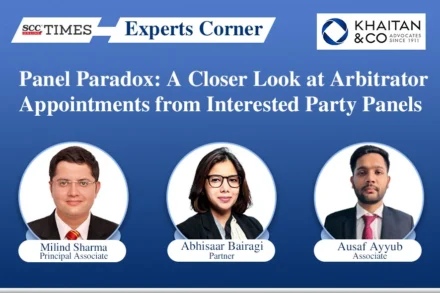
Panel Paradox: A Closer Look at Arbitrator Appointments from Interested Party Panels
by Abhisaar Bairagi*, Milind Sharma** and Ausaf Ayyub***

Delhi High Court | Arbitral Tribunal cannot award certain types of damages if they are specifically excluded by contractual clauses
The Court emphasized the necessity of adhering to the specific terms and limitations outlined in contractual clauses. This decision underscores the importance of clear contractual provisions and their binding nature on arbitral tribunals, reaffirming that such limitations must be respected and enforced in arbitral awards.


